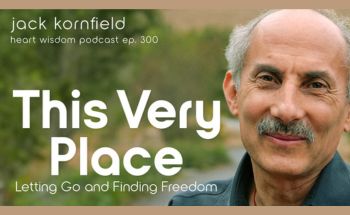Misconceptions about selflessness and emptiness abound, and such confusions undermine genuine spiritual development. Some people believe that they can come to selflessness by struggling to get rid of their ego-centered self. Others confuse the notion of emptiness with inner feelings of apathy, unworthiness, or meaninglessness that they have carried from a painful past into spiritual practice. We have described how students use emptiness as an excuse for withdrawal from life, saying it is all an illusion, trying to make a “spiritual bypass” around life’s problems. But each of these diseases of emptiness misses the true meaning of emptiness and its liberating freedom.
To try to get rid of the self, to purify, root out, or transcend all desire, anger, centeredness, to vanquish a self that is “bad,” is an old religious idea. This notion underlies the ascetic practices, such as wearing hair shirts, extreme fasting, and self-mortification, that are found in many traditions. Sometimes such practices are used skillfully, to induce altered states, but more often they only reinforce aversion. Worse, what comes with them is the notion that our body, our mind, our “ego,” is somehow sinful, dirty, and deluded. “I (the good part of me) must use these techniques to get rid of the self (the lower, bad part of me).” But this can never work. It can never work because there is no self to get rid of! We are a changing process, not a fixed being. There never was a self- only our identification makes us think so. So while purification, kindness, and attention can certainly improve our habits, no amount of self-denial or self-torture can rid us of a self, for it was never there.
When emptiness is confused with the deficiency and emotional poverty that many students bring to spiritual practice, it can perpetuate difficulties in other ways. As we have discussed, spiritual practice attracts a great many wounded people who are drawn to such practice for their own healing. Their numbers appear to be increasing. The spiritual impoverishment of modern culture and the number of children raised without a nurturing and supportive family is growing. Divorce, alcoholism, traumatic or unfortunate circumstances, and painful child-rearing practices all can produce people who lack an inner sense of security and well-being. These children grow up to have adult bodies but still feel like impoverished children. Many such “adult children” live in our society. Their pain is reinforced by the isolation and denial of feelings that is common in our culture.
Many student have come to a spiritual practice with this problem, what some psychologists call a “weak sense of self” or a “needy ego,” with holes in their psyche and heart. This deficient sense of self is carried for years by our habits and bodily contractions, by the stories and mental images we have learned to tell ourselves. If we have a deficient sense of self, if we perennially negate ourselves, then we may easily confuse our inner poverty with selflessness and believe it to be sanctioned as the road to enlightenment.
Confusion of selflessness with inner poverty can be especially difficult for women. In our male-dominated culture, a woman can grow up feeling that she doesn’t really count, that she will not amount to much in this man’s world, that a woman’s fate and work is not of value. This powerful conditioning can lead to an identity riddled with depression, fear, and a pervasive feeling of inadequacy.
One woman who came to meditation practice feeling this way believed she had a deep understanding of emptiness. For five years, she had studied with a young teacher who himself was confused about emptiness. When she came to see me, she talked about how deeply she had understood the teachings of selflessness and the impermanent, insubstantial nature of life. She states that whenever she practiced walking meditation or sitting meditation, she experienced selflessness very clearly. But to me she simply looked unkempt and depressed, so I inquired further. I asked her to describe exactly how she experienced emptiness. Then I asked her to do her walking meditation in front of me and tell me precisely what she noticed. As she walked, I pointed our a heaviness in her walk and a contracted quality of her body. Soon she could see it too. As she explored her experience, it turned out not to be emptiness at all, but numbness and deadness. As we talked, it became clear that her body and feelings had been shut down for years. Her self-esteem was low, and she felt herself incapable of doing worthwhile things in the world. She confused this inner feeling with the profound teachings of insubstantiality. Sorting out this confusion began to bring her back to life.
Similar confusion happens when “emptiness” is misunderstood as “meaninglessness.” This misperception can reinforce our underlying depression and fear of the world, justifying our inability to find beauty or our lack of motivation to participate in life.
The difference between true emptiness and the emptiness of depression can be illustrated by two salutations. An awakened person might say, “Good morning, God.” whereas a depressed or confused person would be more likely to say, “Good God, morning.” Confusing the two can lead to a kind of passivity: “It’s all the illusion, it’s all a spiritual dream unfolding. I don’t have to do anything. We don’t do anything ourselves anyway.” This kind of passivity is related to indifference, the near enemy of equanimity, which was discussed earlier. An understanding of the mystical emptiness of things is not at all passive; the mark of true emptiness is joy; it enlivens the appreciation of the mystery of life as it appears to us each moment out of the void.
A final confusion around emptiness can appear when we imagine that in feeling emptiness we are impervious to the world or above it all. A samurai who believed this came to a Zen master and boasted, “The whole world is empty; it is all emptiness.” The Zen master answered, “Hah, what do you know of this? You’re a dirty old samurai,” and thew something at him. The samurai in an instant drew his sword-he was truly insulted- and an insult to a samurai is made at the cost of your life. The Zen master just looked up and said, “Emptiness is quick to show its temper, isn’t it?” The samurai understood, and the sword returned to its scabbard.
This excerpt is taken from the book, “A Path With Heart“






